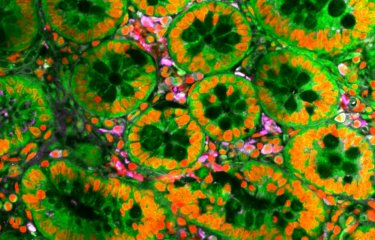Hidradenitis suppurativa is a skin condition that causes painful abscesses in skin folds. There are three stages of the disease. A new clinical trial, ABCESS2, has recently been launched to treat stage II hidradenitis suppurativa. The trial is being led by the Institut Pasteur.
Throwback in video on the causes, the symptoms and the treatment of hidradenitis suppurativa. Copyrights : Jeanne Fenouil / Institut Pasteur
Hidradenitis suppurativa (HS) is a condition that is thought to affect around 1% of the global population. The causes of this disease are multifactorial and include genetic, immune, and microbiological factors. People with hidradenitis suppurativa have a reduced quality of life and may develop depressive disorders. The disease not only impacts them psychologically, leading to low self-esteem, but also socially. Chronic episodes can lead to sufferers being unable to attend school or college or having to go on sick leave.
There is currently no definitive treatment for this disease. Certain antibiotics, biotherapies, and surgery for lesions can help manage flare-ups, but continuous maintenance treatment is crucial to prevent relapses.
Launch of a promising trial for stage II hidradenitis suppurativa
That is why a therapeutic trial led by Dr. Maïa Delage and Dr. Aude Nassif, two dermatologists working at the Institut Pasteur Medical Center, is set to launch this month. The trial opened in May 2024, and 12 patients in the Paris region have already been preselected to participate.
The supply of antibiotics has now been secured to launch this clinical trial, which involves several teams from the Institut Pasteur* working with French hospitals including Saint-Joseph Hospital in Paris, La Timone Hospital in Marseille, and Rouen University Hospital. Other hospitals in France will also be included in the study.
The trial follows a discovery in 2007 and 2008 by a team led by Professor Join-Lambert, assisted by Dr. Maïa Delage and Dr. Aude Nassif, that enabled the bacteria present in lesions to be isolated and identified for the very first time. Until this discovery, hidradenitis suppurativa had for many years been considered a purely inflammatory disease with no therapeutic solution.
The ABCESS2 study focuses on a new strategy for treating patients with stage II hidradenitis suppurativa. "The aim of the study is to demonstrate the efficacy of a combination antibiotic therapy," explains Maïa Delage. Four antibiotics appear to make for an effective cocktail against the disease (ceftriaxone, rifampicin, moxifloxacin, and metronidazole).
*INVOLvE : his entity’s mission is to conduct clinical investigation activities to enable the Institut Pasteur’s scientific teams or collaborators to carry out research in biology and human health. INVOLvE acts both as an investigator center providing care for research participants and as a platform interacting closely with scientific teams.
*PC-RC : the Clinical Research Coordination Office supports scientists with projects involving healthy subjects or patients and ensures compliance with ethical and regulatory requirements.
Evaluation of multiple efficacy against hidradenitis suppurativa
"Efficacy will be measured in a number of ways. We’ll evaluate clinical and microbiological efficacy by looking at whether lesions regress and disappear. But we’ll also be paying close attention to the efficacy of the treatment on patient quality of life. The use of any additional treatment and any relapses after remission will also be a key focus of the evaluation," adds Maïa Delage.
If efficacy is proven, treatment standardization and new guidelines may be implemented. This will improve treatment for patients with stage II hidradenitis suppurativa.
This measure of efficacy will be evaluated impartially and with scientific rigor: the treatment group to which each patient is assigned will remain unknown. Patients will be selected at random to receive either the standard treatment or the treatment being trialed. Neither physician nor patient will know which treatment has been allocated. "This is necessary to evaluate the efficacy of the treatment objectively," says Aude Nassif.
Breakthrough in the treatment of patients with hidradenitis suppurativa
The trial needs to recruit 92 patients treated at six centers in France, including 46 patients at the Institut Pasteur. Treatment will be monitored for twelve months, with a total of seven check-ups by a physician.
Following completion of the ABCESS2 study, the results of the trial will be announced by 2028. If the results demonstrate a disappearance of hidradenitis suppurativa symptoms, this new combination antibiotic therapy could offer a new therapeutic solution for this extremely debilitating disease.
For more information, please visit





